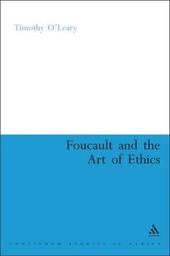
|
Foucault and the Art of Ethics
Paperback / softback
Main Details
| Title |
Foucault and the Art of Ethics
|
| Authors and Contributors |
By (author) Timothy O'Leary
|
| Physical Properties |
| Format:Paperback / softback | | Pages:226 | | Dimensions(mm): Height 234,Width 156 |
|
| Category/Genre | Ethics and moral philosophy |
|---|
| ISBN/Barcode |
9780826481689
|
| Classifications | Dewey:170 |
|---|
| Audience | | Undergraduate | | Postgraduate, Research & Scholarly | | Professional & Vocational | |
|---|
|
Publishing Details |
| Publisher |
Bloomsbury Publishing PLC
|
| Imprint |
Continuum International Publishing Group Ltd.
|
| Publication Date |
15 June 2006 |
| Publication Country |
United Kingdom
|
Description
The work of Michel Foucault has been extremely influential in fields as varied as philosophy, history, cultural studies, sociology and sexuality studies. In his later work, Foucault turned to the question of ethics. Working back through history, through the Christian interrogation of desire to the origins of the self in the texts of classical Greece, Foucault attempted to conceive of ethics as an art of the self, as an aesthetics of existence and as a practice of liberty. Foucault and the Art of Ethics argues that Foucault's exploration of the history of sexuality and his reinterpretation of the critical philosophical tradition combine to frame a new approach both to the way we understand the tasks of philosophy and to the way we live our lives. The book is essential reading for all those working at the intersection of contemporary debates in philosophy, ethics, politics and cultural studies.
Author Biography
Timothy O'Leary is Assistant Professor of Philosophy at the University of Hong Kong. He has spent several years working in the Foucault Archives and has published on Foucault, aesthetics and literature. He is the author of Foucault and the Art of Ethics (Continuum 2006).
Reviews"'Foucault and the Art of Ethics is an excellent, critical exploration of the contribution which Foucault's philosophy makes to the contemporary discussion of morality. It shows that Foucault is a significant thinker because, unlike so many other contemporary philosophers, he asked the most important questions: How are we to live?' James Bernauer, Boston College"
|